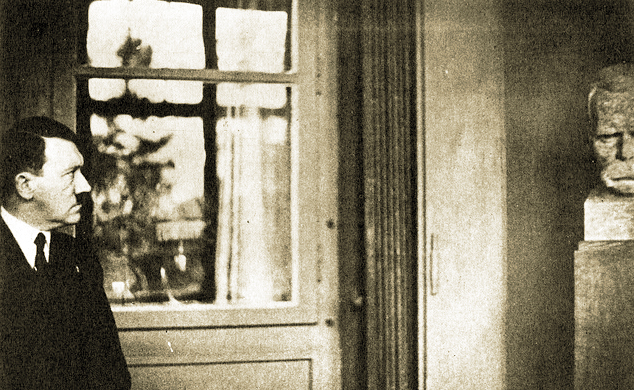The following is my abridgement of chapter 20 of William Pierce’s history of the white race, Who We Are:
Unending Struggle Between European and Asian in the East
Slavic Lands Repeatedly Overrun by Asian Hordes
Sviatoslav, Viking Ruler, Stamps out Khazar Pest
Mongol Terror Rules Russia for 250 Years
Today the geographical boundary between Europe and Africa-Asia runs roughly from the Strait of Gibraltar eastward across the Mediterranean to the Aegean Sea, along the eastern and northern shores of the Black Sea, thence along the spine of the Caucasus range to the Caspian Sea, and northward along the Urals to the Arctic Ocean. Somewhat more roughly a racial boundary follows the same course, dividing Whites to the north and west from non-Whites to the south and east.
Throughout history the borderlands on either side of this boundary have been contested between White and non-White, between European and Asian, and the contest has been fiercer, bloodier, crueler, and more unrelenting than any of the wars Europeans have fought among themselves. This is as it should be, considering the vastly greater stakes: when European fought European, the outcome determined which sovereign taxes would be paid to or the language one’s descendants would speak, but when European fought Asian the issue was whether or not one’s descendants would be White.
Three-phase Struggle. The contest actually began long before the dawn of history, nearly 10,000 years ago, when the Mediterraneans of northern Africa and the Middle East began infiltrating Europe during the Neolithic period, Mediterraneanizing the southern coastal regions of the continent.
The second phase began about 6,000 years ago with a European counterattack. The Nordic Indo-Europeans sent wave after wave of conquerors, not only into Mediterraneanized Southern Europe and the Cro-Magnon realm in the North, but also into Asia and northern Africa. This phase lasted roughly 4,000 years and, as we have seen in earlier installments in this series, had mixed success.
The third phase began about 16 centuries ago, in the year 372, when the Huns came swarming around the north end of the Caspian Sea into southern Russia, a Brown pestilence from Mongolia.
Europe managed to stem the Brown tide in each case, but only at enormous cost. Huge areas of Europe were overrun by the Huns and their successors: Avars, Bulgars, Khazars, Magyars, Patzinaks, Cumans, Mongols, and Ottomans. Sometimes it was more than a century before the invaders could be expelled, and a great deal of racial mixing took place meanwhile.
Some European territory was lost permanently. Even today a large section of the ancient Indo-European homeland on the western shore of the Caspian Sea remains racially Mongoloid, while pockets of racially mixed population can be found throughout Eastern and Southeastern Europe. In other areas the languages of the invaders have displaced the original European languages, even where most of the Asian genes left behind have been thoroughly diluted.
Will there be a fourth phase in the age-old struggle between Europe and Asia? Without a doubt, although it is difficult to forecast the exact form it will take, or even which side will be on the offensive. Certainly, Central Asia has thoroughly lost the threatening aura it had in the days of Genghis Khan and the Golden Horde, and modern Turkey, wracked by internal problems, does not seem a menace to Europe, except in the stream of immigrant workers it is sending into the Western nations.
On the other hand racial Europe—including both Russia and the United States—is as disunited and as spiritually confused as it has ever been. If it is to regain the initiative in the struggle for possession of the planet, it must first regain a measure of unity, based on racial consciousness, and build new spiritual foundations for itself. The principal purpose of this series is to aid in the building of the necessary racial consciousness. So, let us begin looking again at the details.
End of the Golden Age. Perhaps the greatest tragedy of the Hun invasion was the disaster which befell the Alans. The godlike race of Odin and Frigg, of Thor and Balder, met its Ragnarok.
Although the Alan nation was not annihilated, its Golden Age was over. Some were driven south into mountain strongholds high in the Caucasus, where they maintained a national identity for another five centuries. Others fled westward, and most of these shared the fate of the Vandals in Africa. The rest became vassals of the Huns and were turned against their own race.
Then, in the middle of the sixth century, even before Europe had recovered from the desolation left by the Huns, the next Brown wave struck. Driven westward by intertribal warfare in Central Asia, an amalgamation of Mongol tribes known to Europeans as the Avars invaded the Russian steppe in 560. Conquering the Slavs as they went, they were only halted when they came up against the Franks on the Elbe, in 562.
The Avars virtually annihilated the Gepids, to which nation the noble Ardaric, vanquisher of the Huns, had belonged, and seized the Gepids’ territory in Pannonia (modern Hungary), thenceforth centering the Avar empire there. They also dislodged the German Lombards (Langobarden, i.e., “long-beards”) from their ancestral lands, and the latter then invaded Italy, seizing most of the northern half of the peninsula (568-572) and making Pavia the capital of a new Lombard kingdom.
The Avar strength peaked before 600 and declined quite rapidly thereafter, except in Pannonia. Throughout the first quarter of the seventh century one group of Slavs after another asserted its independence of the Avar rulers, and by 626, in which year an Avar attack on Constantinople was repelled, the Slavs had inherited nearly the whole of the Avar empire outside Pannonia.
In 576 another Brown wave lapped at Europe’s eastern frontier, as a Turkish tribe invaded the Caucasus and established a beachhead along the northwestern shore of the Caspian. Compared to the two waves which had preceded them, this was a relatively minor one, but it was to have by far the most lethal consequence for Europe in the long run: the new invaders called themselves Khazars.
Origin of the Ashkenazim. The Khazars themselves also underwent a transformation during the eighth century: they adopted Judaism as their religion, and thereafter their national character began to change. From a warlike, nomadic people interested mainly in raiding and fighting, they became a nation of armed merchants and tax collectors. As the principal power in the region north of the Caucasus, they controlled trade between the Arab power to the south, the Turkish power to the east, the Volga-Bulgar power to the north, the Magyar power to the west, and the Byzantine power to the southwest.
Unfortunately, a substantial portion of the trade controlled by the Khazars was in White slaves, with the Slavs bearing the brunt. So many Slavs, both male and female, were shipped southward and eastward by their Khazar rulers that their very name gave rise to the word “slave.”
Birth of a Nation. Rurik arrived in northern Russia, near Novgorod, in or about the year 856, and his arrival is considered to mark the beginning of Russian national history.
Prince Rurik, ruler of Novgorod, died in 879, and he was succeeded by his kinsman Oleg, a Norwegian by birth, who united the principalities of Novgorod and Kiev and then energetically expanded the territory under Rus rule. Viking Russia rapidly became the principal power in the east.
In 964 Rurik’s grandson Sviatoslav, later acclaimed “the Great,” ascended the throne of Russia. Christian missionaries were beginning to ply their trade in Russia, and Sviatoslav’s mother Olga had allowed herself to be baptized, but this proud Viking lord would have none of it; he insisted on holding to the faith of his Scandinavian forebears.
It is fitting that such a warrior, almost as soon as he took the rule, chose as his first task the elimination of the Khazar pestilence. In 965 he utterly laid waste the Khazar empire (to the accompaniment, no doubt, of loud wails protesting his “anti-Semitism”). It can only be regretted that he did not hunt down and dispatch the last member of the tribe; instead he merely scattered them to the four winds, and their descendants, who make up the bulk of eastern Europe’s Jews, are taking their revenge to this day on the White world.
Back in Central Europe the Magyars, as soon as they had taken possession of Hungary, became the scourge of their German, Slav, and Byzantine neighbors for the next half century, raiding as far afield as Bremen, Orleans, and Constantinople. In 954 a raiding party of close to 100,000 Magyars swept through Bavaria and into Franconia, crossed the Rhine at Worms, and devastated northeastern France. They raped, burned, and butchered their way through Rheims and Chalons into Burgundy, then crossed the Alps into Italy to pillage Lombardy.
Again it was the Germans to the rescue. The following year another Magyar army invaded Bavaria and besieged Augsburg. Otto I, the Saxon king, arrived with an army of only 10,000 men and annihilated the Magyar force, in the battle of the Lechfeld. The Germans pursued and slew fleeing Magyars for three days following the battle, and the Magyars were never after that a major threat to Europe.
Diversity of the Invaders. It should be noted here that there was a fair amount of diversity in the various Asian waves which had been impinging on Europe’s eastern frontier since the fourth century. All the groups involved spoke languages of the Ural-Altaic group (the Magyars spoke a Uralic language; all the others spoke Altaic); they were all mounted nomads; and they all contained a strong Mongoloid racial element.
It was primarily in this last feature that the diversity was found. Each group passed through a vast expanse of territory in reaching Europe, and this territory was not empty. Although the Sarmatians were the last White group to enter Europe from the east, there were other Whites left in Turkistan—and even further east—who didn’t make it to Europe before the first Brown wave from Central Asia washed over them and submerged them.
Some of the Asian invaders traveled quite rapidly through the peoples between their own homelands and Europe, absorbing little if any White blood on the way, while others took centuries to make the passage. Even those who did not linger among White or part-White populations often had absorbed some White genes as a result of the slave trade. From the fourth century through the 15th century there was an enormous traffic in White slaves, with millions of Slavs trudging eastward in slave caravans.
Thus, while the Mongols who struck in the 13th century passed like lightning from Mongolia to the eastern border of Europe, their chieftain, Genghis Khan, was described by contemporaries as having green eyes and reddish hair—undoubtedly a consequence of the slave trade. Some Turkish leaders were described as almost White in appearance.
Finally, we must remember that race treason is not a new phenomenon. Conquered Slav, Sarmatian, and German peoples sometimes became military auxiliaries of their Brown conquerors. When Attila was defeated by the Visigoths in 451 at Chalons, his horde consisted not only of Brown Huns but also of a number of White allies from the territories through which he had passed.
 “Lord of the Earth.” The first years of the 13th century saw the rise of the next and most terrible of the Asian menaces. In 1206 a Mongol chieftain, Temujin, succeeded in unifying the numerous, perennially quarreling factions and tribes of Mongolia. He then set out on a career of conquest which has never been equaled. In preparation for this career he changed his name to Genghis Khan, “lord of the earth.”
“Lord of the Earth.” The first years of the 13th century saw the rise of the next and most terrible of the Asian menaces. In 1206 a Mongol chieftain, Temujin, succeeded in unifying the numerous, perennially quarreling factions and tribes of Mongolia. He then set out on a career of conquest which has never been equaled. In preparation for this career he changed his name to Genghis Khan, “lord of the earth.”
Genghis Khan’s first raiding parties reached Europe in 1221 and won several victories over the princes of southern Russia. He died in 1227, giving Europe a brief respite which it failed to put to good use. When the Mongol horde appeared on Europe’s border again in 1236, a campaign of terror not matched since the days of the Huns was unleashed.
Whole areas of southern Russia were depopulated, and Mongol raiders struck deep into the Balkans, Hungary, northern Russia, Poland, and even Germany. In scenes foreshadowing the winter of 1944-5, hundreds of thousands of terrified refugees fled westward as the Mongols, moving rapidly across frozen rivers in the dead of winter, destroyed everything in their path. In Russia the Mongols even sent squadrons back into cities which had been sacked a few days earlier, in order to hunt down and kill any survivors who might have crept out of their hiding places.
An army of Germans, Poles, and Teutonic Knights, under the command of Duke Henry II of Silesia, attempted to halt the Mongols at Liegnitz, Prussia. In a battle fought there on April 9, 1241, the Europeans were decisively defeated. Just two days later another Mongol column completely destroyed the Hungarian army at the SajoRiver, about 100 miles northeast of Budapest.
These two crushing defeats left Central Europe completely at the mercy of the Mongols, who proceeded to consolidate their hold on Hungary and made plans to invade Italy, Austria, and Germany the following winter.
Just after Christmas of 1241 they started westward across the frozen Danube—when suddenly a messenger arrived from Karakorum, 6,000 miles to the east, bearing word that Ogatai, Genghis Khan’s successor, had died. The Mongols immediately turned their army around and marched back to the east, never to return.
All of eastern and southern Russia remained under occupation by the Mongol horde, however, and the rest of Russia escaped occupation only by acknowledging itself a vassal state and paying tribute to the Mongols.
[After a few paragraphs Pierce writes of another type of calamity of Asian invaders into Europe: the Muslims]
The most effective means which the Ottomans employed in their struggle against White Europe, and the most humiliating to their White adversaries, was their corps of Janissaries. The Janissaries were the Ottomans’ elite army and they were entirely White.
During the reign of Emir Orkhan (1326-1359), the Ottoman ruler who first seized European soil, an edict was issued commanding the Emir’s White subjects to deliver to him each year exactly 1,000 young, male children.
These children, who were required to have faces “white and shining,” were torn from their mothers’ breasts and then raised by the Turks with special care and rigor, trained in arms from a tender age and conditioned to give absolute obedience to their masters. Their military discipline was especially severe, but they were liberally rewarded for courage and proficiency.
The yearly levy of 1,000 White children was continued for 300 years, until 1648, and during that period the Janissaries came to be the most efficient and feared corps of warriors in the world. They sustained the Turkish power in Central Europe, while the Mongol power in Eastern Europe withered.
Hungary was the unfortunate battleground between Europeans and the Turks and their Janissaries during much of this time, with ownership of various parts or the whole passing back and forth from one side to the other.
At times the Turks entertained dreams of a general conquest of Europe, and it was not until the failure of their second siege of Vienna in 1683 that they began a slow retreat which lasted almost another two and one-half centuries. Even today Turkey retains a beachhead of several thousand square miles on the European side of the Bosporus.
Bastardized Balkans. The Ottoman Turks were the last of the Asian invaders of Europe, but they were certainly not the least. Their occupation has left as severe a racial imprint on the Balkan peoples—Yugoslavs, Albanians, Greeks, Bulgarians, and Rumanians—as the Mongol occupation did on the Russians.
Nevertheless, there remain today many groups throughout the Balkans which are as White as any group in Western Europe: some are immigrants from the north during recent centuries, while others are the descendants of clans and tribes which jealously guarded the purity of their blood and were able to avoid substantial racial mixture even during the darkest days of Asian occupation.






